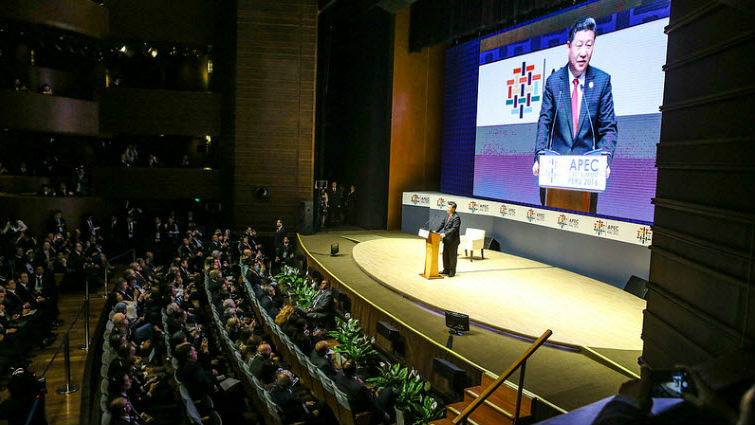China Talks Trump-Free Trade

Chinese President Xi Jinping pledged to further open the world's second-largest economy on Saturday, as leaders of Asia-Pacific countries gathered in Peru to find new free-trade options after Donald Trump was elected U.S. president on a protectionist platform.
The annual APEC summit got under way in Lima just over a week after Trump's surprise victory dashed hopes of the largest-ever U.S.-proposed trade deal, the Trans-Pacific Partnership (TPP), coming to fruition.
President Barack Obama championed the TPP as a way to counter China's rise, but his administration has now stopped trying to win congressional approval for the deal, which was signed by 12 economies in the Americas and Asia-Pacific, excluding China. Without U.S. approval the agreement as currently negotiated cannot be implemented.
Throughout his campaign, Trump strongly criticized U.S. free-trade deals, vowing to pull the world's biggest economy out of the TPP and promising to impose tariffs on imports from trade partners China and Mexico.
China's Xi is selling an alternate vision for regional trade by promoting the Beijing-backed Regional Comprehensive Economic Partnership (RCEP), which as it stands excludes the Americas.
"China will not shut its door to the outside world but open more," Xi said in a keynote address.
With the fate of the TPP now uncertain, China's talks on RCEP are seen as the only viable path to the broader Free Trade Area of the Asia-Pacific (FTAAP) that APEC aspires to.
The Obama administration has warned that the RCEP would not include strong protections for workers, the environment or intellectual property.
"We are going to involve ourselves in economic globalization and we back FTAAP," Xi said. "We're going to...make sure the fruits of development are shared."
Despite China's overtures, some APEC members are determined to press on with TPP and held out hopes that the United States would still show leadership on trade.
"Our geopolitical position is with the United States, obviously," Mexican President Enrique Pena Nieto said. "That's where our eyes are set, and that's what we are working for."
Pena Nieto said the North American Free Trade Agreement between the United States, Mexico and Canada should be "modernized."
"TRUMP PACIFIC PARTNERSHIP"
New Zealand Prime Minister John Key praised the United States as an important partner in the region, but said China would fill the void if a Trump administration backs away from free trade promotion.
Key said TPP members might be able to incorporate "cosmetic changes" to make the deal more palatable to the former real estate magnate and reality TV star.
"The Trump Pacific Partnership for instance, that'd be fine," said Key.
Peru and Japan signed a joint statement pledging to work harder to put into force the 12-nation accord.
Mexico, Japan, Australia, Malaysia, New Zealand and Singapore, however, aim to continue with TPP with or without the United States, Mexico's economy minister, Ildefonso Guajardo, said on Friday.
The 21 members of APEC have also finished a study for a regional free-trade area that was designed to examine lessons learned from TPP and RCEP talks, but they will not discuss it until the next annual summit in Vietnam.
Though most were careful not to criticize Trump directly, leaders at APEC, which ends on Sunday, universally warned of the dangers of turning away from globalization and free trade.
Asked about the dangers of protectionism, Australian Prime Minister Malcolm Turnbull said, "It is the way to poverty."
"We know - we have seen this film before," he told journalists on Friday. "The world did this in the 1930s after the Great Depression and in fact made it much worse."
Trump has called the TPP a job-killing "disaster" and a "rape of our country."
Arriving at the summit on his last scheduled trip abroad as president, Obama told leaders he looked forward to constructive talks.
